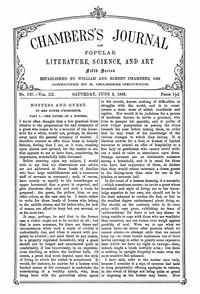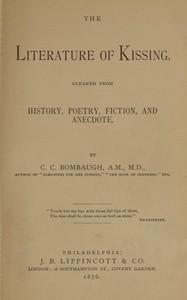Read this ebook for free! No credit card needed, absolutely nothing to pay.
Words: 20107 in 5 pages
This is an ebook sharing website. You can read the uploaded ebooks for free here. No credit cards needed, nothing to pay. If you want to own a digital copy of the ebook, or want to read offline with your favorite ebook-reader, then you can choose to buy and download the ebook.


: Chambers's Journal of Popular Literature Science and Art fifth series no. 127 vol. III June 5 1886 by Various - Periodicals
Release date: August 19, 2023
Original publication: Edinburgh: William and Robert Chambers, 1853
HOSTESS AND GUEST.
BY MRS POWER O'DONOGHUE.
I have often thought that a few practical hints relative to the preparations for and treatment of a guest who comes to be a member of the household for a while, would not, perhaps, be thrown away upon the general company of readers. I therefore venture to offer these hints in homely fashion, feeling that I am, as it were, treading upon almost new ground, for the matter is one that appears to me to have been, considering its importance, wonderfully little discussed.
Before entering upon my subject, I would wish to say that my observations and advice are not addressed to those heads of families who have large establishments and a numerous staff of servants at command; such, of course, have merely to signify to the housekeeper or upper housemaid that a guest is expected, and give directions that such and such a room be prepared: the green, the yellow, blue, or any other colour, as the case may be. I desire rather to write for those heads of houses who belong to the middle classes, and for ladies who, for lack of means, can afford to keep but one servant, or at the most two.
It may, perhaps, be said that in the former case a visitor ought not to be invited at all; but that is mere nonsense, for there are times and circumstances when such a mark of civility is undoubtedly due, and when it cannot with propriety be avoided; nor need there be any reason, in a properly regulated household, why a guest should not be lodged and entertained quite as comfortably, if less luxuriously, in an unpretentious dwelling as within the lordliest halls. Of course, a great deal must depend upon the style of living to which the visitor is accustomed. It would, for instance, be unwise for a hostess with limited means at her command to undertake the entertaining of a wealthy nabob, who, from being born with the proverbial silver spoon in his mouth, knows nothing of difficulties or struggles with the world, and is in consequence a mere mass of selfish exactitude and caprice. Nor would it be judicious for a person of moderate income to invite a gourmet, who lives to pamper his appetite, and is guilty of such vulgar pomposities as passing the wines beneath his nose before tasting them, in order that he may boast of his knowledge of the various vintages to which they belong. It is likewise unwise for a host or hostess of limited resources to extend an offer of hospitality to a fine lady or gentleman who cannot travel without a maid or valet in attendance upon them. Strange servants are an intolerable nuisance among a household, and it is usual for those who have had experience of them, to declare that they would rather entertain a dozen guests in the dining-room than cater for one in the kitchen or servants' hall.
In the event of a hostess deeming it a necessity--which sometimes occurs--to invite a guest whose household and style of living are to her knowledge superior to her own, she should not be in the least ashamed to confess the fact, or feel in the smallest degree embarrassed about doing so. She should, on the contrary, refer to it--once only--with easy grace, exhibiting no trace of 'awkwardness,' for there is not any shame in being unable to cope with those who are wealthier than ourselves, nor can riches ever weigh against gentility of soul. Were we to ape what we cannot have--to strive after position which we cannot attain--to attempt style that we cannot keep up--to cheat honest tradesmen out of their lawful earnings in order to gratify some expensive taste which we have no right to indulge--then, indeed, might a blush lawfully arise; but there is nothing in upright frugality to make even the most sensitive feel ashamed.
I have said, refer to the matter once only, because I consider it a sign of extreme bad taste to keep perpetually offering apologies to visitors, in the event of things not being quite so grand or imposing as the hostess may desire. How frequently we are put to the pain of listening to such sentences as: 'Do, pray, take some more; although I know it is not so good as you have at home'--'I hope you slept well, though I am afraid you missed your own fine big room,' &c. This display of deferential anxiety cannot be otherwise than painfully embarrassing to a visitor, and looks as though the hostess were either throwing out perpetual hints for compliments upon the excellence of her house and table, or as if she were really uncomfortably conscious of deficiencies which are perhaps noticeable to herself alone. A few words--the briefer the better--spoken to the guest on arrival, or inserted in the note of invitation, are sufficient to answer all purposes: 'You are aware, Miss--or Mr' , 'that our means are not sufficient to admit of any style; but I hope you will be comfortable, and I am sure you will be welcome.'
A hostess of moderate income, such as I am writing for, should always ascertain personally that the bedchamber intended for her guest's use is comfortably arranged and the bed-clothing properly aired. These are things which, if left to the care of the ordinary run of servants, will in most instances be performed in a very slovenly manner. As I intend that these observations shall be of a decidedly practical nature, I shall state plainly my ideas respecting the arrangement of a guest-chamber in an ordinary middle-class house. Ignoring, then, the existence of a family bathroom, the visitor's apartment should be provided with a bath, a large sponge, and a plentiful supply of towels. The first of these should be kept turned up in some spare corner by day, and laid down at night by the chambermaid, with a square of oilcloth or felt underneath, to save the carpet from being wetted; for some persons are very untidy bathers, and make a terrible splashing when they indulge in a 'tub.' The sponge should be kept in a little basket, made to hook on to the lower rail of the towel-stand, which is in every way preferable to keeping it in a bag. Care should be taken that the looking-glass does not, when touched, make a low salaam--the upper end coming down upon the nose of the visitor, while the lower portion departs out of sight! This is very frequently the case in hotels and lodging-houses, and indeed in too many private dwellings also; and it can be so easily rectified by the bestowal of a little care upon the screws, that it is quite wonderful how persons can contentedly go on from month to month propping up the disabled toilet-mirror--or leaving others to do it--with a hairbrush, or pocket-handkerchief, or half a newspaper folded into a pad.
I have occasionally stayed at houses, and very frequently at hotels, where there was no such thing in my room as a wardrobe at all, in any shape or form--not even a shelved press, or a clothes-rack on the wall. This is dire misery, and is an unpardonable omission on the part of those in authority over the management of affairs. It is not by any means a matter of necessity that a costly glass-panelled wardrobe should be provided. Many households cannot afford such; but a neatly painted one is not an extravagance; and in the event of a narrow staircase or doorway preventing ingress to such a piece of furniture, there is an excellent plan for improvising a wardrobe, which I have seen tried with great success. Nail up a substantial clothes-rack in a recess of the room; suspend a brass rod across it, on which are curtains hung on rings, and cover in the top with strong calico, leaving a neat valance of the curtain-stuff, bordered with fringe, to hang over the edge. Any place, in short, which will allow of coats and dresses being hung up, to prevent the creasing which they suffer by folding, and to preserve them from dust, cannot fail to be acceptable to a visitor, when he or she comes to unpack.
Always make sure that the window-blinds are in perfect working order. They are at times too stiff, or too loose, or so much out of gear that if drawn down at night they remain immovable in the morning, and the guest is obliged to dress in semi-darkness. See, also that the windows themselves are properly in order. Every window ought to be made to open both at top and bottom, as this admits of the immediate and thorough ventilation of the room. If, however, through defective carpentering in the first instance, the windows are hermetically sealed at the top--as is too frequently the case in old houses--make certain at all events that the lower sash opens and shuts with ease, and that when closed it does not admit a draught. Above all things, see that means are provided to prevent the shaking of windows in windy weather. Few things are so aggravating to the temper, and at the same time so wearying to the constitution, as being kept awake at night by the ceaseless and monotonous 'bang, bang' of a loose window-sash, which, after all, can be very easily remedied without adopting the old-fashioned method of thrusting a toothbrush handle or rack-comb between the sashes, to act as a sort of wedge. Procure two neat flat pieces of wood, about four inches in length; drill a hole in the centre of each; affix one at each side of the window-frame with a screw, which you must not drive in too closely, but leave sufficient of the head for the wood to revolve or move upon. You will find that by slightly lifting the outer or lower end of the wood, the other end becomes pressed against the edge of the window-sash, which it holds perfectly steady; and that by declining or lowering this outer or lower end, the sash is released from pressure. The plan is an invention of my own; and I must not be considered egotistical for saying that it is an excellent one, as it will silence the noisiest window in an instant of time. A small bar of brass, treated in the same manner as the wood, looks more ornamental, and is of course stronger, where much pressure is desirable. Should there be any aperture or draught, a neat piece of cloth may be nailed along the sash, and will effectually exclude it.
Free books android app tbrJar TBR JAR Read Free books online gutenberg
More posts by @FreeBooks

: A narrative of travels on the Amazon and Rio Negro by Wallace Alfred Russel - Natural history Amazon River Valley; Amazon River Valley; Brazil Description and travel; Indians of South America Amazon River Valley; Indians of South America Amazon River Valle


: Tama by Watanna Onoto Aaltio Eetu Translator - Love stories; Japan Fiction; Americans Japan Fiction






